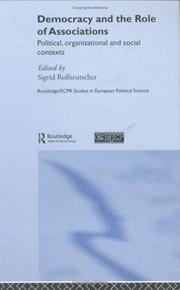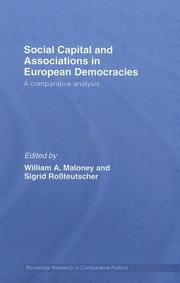| Listing 1 - 10 of 13 | << page >> |
Sort by
|

ISBN: 1134342489 1280195185 0203358317 9780203358313 9780415325486 041532548X 041532548X 9781134342488 9781280195181 9781134342433 9781134342471 9780415499156 1134342470 0415499151 Year: 2005 Publisher: London Routledge
Abstract | Keywords | Export | Availability | Bookmark
 Loading...
Loading...Choose an application
- Reference Manager
- EndNote
- RefWorks (Direct export to RefWorks)
Voluntary associations have been presented as a solution to political apathy and cynicism towards representative democracy. The authors collected in this volume, however, argue that these claims require more robust substantiation and seek to critically examine the crucial link between the associative sector and the health of democracy. Focusing on the role of context and using diverse approaches and empirical material, they explore whether these associations in differing socio-political contexts actually undermine rather than reinvigorate democracy.
Democracy. --- Non-governmental organizations. --- Civil society. --- Social contract --- INGOs (International agencies) --- International non-governmental organizations --- NGOs (International agencies) --- Nongovernmental organizations --- Organizations, Non-governmental (International agencies) --- Private and voluntary organizations (International agencies) --- PVOs (International agencies) --- International agencies --- Nonprofit organizations --- Self-government --- Political science --- Equality --- Representative government and representation --- Republics --- Civil society --- Democracy --- Non-governmental organizations --- #SBIB:321H30 --- #SBIB:324H60 --- Hedendaagse politieke en sociale theorieën (vanaf de 19de eeuw): algemeen (incl. utilitarisme, burgerschap) --- Politieke socialisatie

ISBN: 0415410533 Year: 2007 Publisher: London Routledge
Abstract | Keywords | Export | Availability | Bookmark
 Loading...
Loading...Choose an application
- Reference Manager
- EndNote
- RefWorks (Direct export to RefWorks)
#SBIB:324H60 --- #SBIB:324H50 --- Politieke socialisatie --- Politieke participatie en legitimiteit (referenda, directe democratie, publieke opinie...) --- Associations, institutions, etc. --- Political participation --- Social capital (Sociology) --- Social participation --- Associations, institutions, etc --- Participation, Social --- Community life --- Social groups --- Capital, Social (Sociology) --- Sociology --- Institutions, associations, etc. --- Networks (Associations, institutions, etc.) --- Organizations --- Voluntary associations --- Voluntary organizations --- Voluntarism

ISBN: 9780415410533 Year: 2007 Publisher: London Routledge
Abstract | Keywords | Export | Availability | Bookmark
 Loading...
Loading...Choose an application
- Reference Manager
- EndNote
- RefWorks (Direct export to RefWorks)
Book
ISBN: 365811276X Year: 2016 Publisher: Wiesbaden : Springer Fachmedien Wiesbaden : Imprint: Springer VS,
Abstract | Keywords | Export | Availability | Bookmark
 Loading...
Loading...Choose an application
- Reference Manager
- EndNote
- RefWorks (Direct export to RefWorks)
Im Mittelpunkt dieses Bandes steht der soziale und politische Wandel der vergangenen Jahrzehnte. Seit den 1980er Jahren hat das deutsche Parteiensystem massive Veränderungen erlebt, aus dem scheinbar stabilen zweieinhalb Parteiensystem entstand allmählich eine heterogene Mehr-Parteienlandschaft. Die deutsche Vereinigung führte zur Ausweitung des Elektorats auf Bürgerinnen und Bürger, die unter völlig anderen systemischen Vorzeichen sozialisiert wurden. Medien- und Bildungssystem haben umfassende Veränderungen erlebt. Dieses Buch stellt die Frage, ob und in welchem Umfang dieser Wandel auch die Einstellungen und Präferenzen der Bürgerinnen und Bürger umfasst. Aus unterschiedlichen Perspektiven untersuchen die Autorinnen und Autoren den Wandel der Einstellungen und Verhaltensmuster in einer Langfristperspektive empirisch. Der Inhalt - Wahlen und Wahlverhalten - Politische Einstellungen Die Zielgruppen Studierende und Lehrende aus den Fachgebieten der Politik- und Sozialwissenschaft sowie Wahlforscherinnen und Wahlforscher, Parteienforscherinnen und Parteienforscher, Forscherinnen und Forscher aus dem Bereich politische Einstellungen sowie die interessierte Öffentlichkeit, politische Parteien und Stiftungen. Die Herausgebenden Sigrid Roßteutscher, PhD, ist Professorin für Politische Soziologie am Fachbereich Gesellschaftswissenschaften der Goethe-Universität Frankfurt am Main. Dr. Thorsten Faas ist Professor für Politikwissenschaft im Bereich „Empirische Politikforschung“ an der Johannes Gutenberg-Universität Mainz. Dr. Ulrich Rosar ist Professor für Soziologie am Institut für Sozialwissenschaften der Heinrich-Heine-Universität Düsseldorf.
Comparative politics. --- Social structure. --- Social inequality. --- Comparative Politics. --- Social Structure, Social Inequality. --- Equality.
Book
ISBN: 9780199662630 0199662630 Year: 2014 Publisher: Oxford Oxford University Press
Abstract | Keywords | Export | Availability | Bookmark
 Loading...
Loading...Choose an application
- Reference Manager
- EndNote
- RefWorks (Direct export to RefWorks)
"Voters on the Move or on the Run? addresses electoral change, the reasons, and the consequences. By investigating heterogeneity of voting, and complexity of voting and its context the volume shows that increasing heterogeneity is not arbitrary and unstructured. Heterogeneity of voting rather is a way of voters dealing with the increasing complexity of the context of elections - diversified social structures, increasing differentiation of political supply, increasing complexity of the information environment. By analysing the conditions of heterogeneity and showing that the calculus of voting becomes more and more conditional in terms of what voters regard as relevant criteria for vote choice, the book demonstrates that the new feature of electoral behaviour is structured heterogeneity. The dimensions of differentiation of the electorate are cognitive capacity and the structure of individual information acquisition systems. The book demonstrates that voters are on the move looking for appropriate answers to new complexities rather than on the run. The book uses data predominantly from the German Longitudinal Election Study (GLES), and also comparative data from the Comparative Study of Electoral Systems (CSES). Cross-sectional analysis is complemented by long- and short-term dynamic analyses with panel data, and comparative analyses"--Publisher's website.
Political participation. --- Elections. --- #SBIB:303H13 --- #SBIB:324H42 --- #SBIB:32H3 --- Electoral politics --- Franchise --- Polls --- Political science --- Politics, Practical --- Plebiscite --- Political campaigns --- Representative government and representation --- Citizen participation --- Community action --- Community involvement --- Community participation --- Involvement, Community --- Mass political behavior --- Participation, Citizen --- Participation, Community --- Participation, Political --- Political activity --- Political behavior --- Political rights --- Social participation --- Political activists --- Methoden en technieken: politieke wetenschappen --- Politieke structuren: verkiezingen --- Politieke wetenschappen: inleidende werken, handboeken, methoden --- Political sociology --- Political participation --- Elections
Book
ISBN: 3748915551 3756008002 9783748915553 Year: 2023 Publisher: Baden-Baden : Nomos Verlagsgesellschaft,
Abstract | Keywords | Export | Availability | Bookmark
 Loading...
Loading...Choose an application
- Reference Manager
- EndNote
- RefWorks (Direct export to RefWorks)
Book
ISBN: 3531940104 Year: 2013 Publisher: Wiesbaden : Springer VS,
Abstract | Keywords | Export | Availability | Bookmark
 Loading...
Loading...Choose an application
- Reference Manager
- EndNote
- RefWorks (Direct export to RefWorks)
Der Band liefert empirische Analysen zur Bundestagswahl 2009. Dabei beleuchtet er insbesondere die bei dieser Wahl außergewöhnlichen Aspekte: die niedrige Wahlbeteiligung (und ihre Hintergründe), die Vielfalt der Koalitionsmöglichkeiten, aber auch die wachsende Bedeutung von Kandidaten. Anknüpfend an den vorherigen Band des Arbeitskreises „Information – Wahrnehmung – Emotion“ liegt zudem ein Schwerpunkt auf politischer Kommunikation sowie der Wahrnehmung und Verarbeitung politischer Informationen. Mit Beiträgen von Thorsten Faas, Kai Arzheimer, Sigrid Roßteutscher, Bernhard Weßels, Christina Eder, Alexander Glantz, Evelyn Bytzek, Marc Debus, Katharina Rohrbach, Ulrich Rosar, Ina E. Bieber, Marion Reiser, Markus Klein, Sascha Huber, Hanna Hoffmann, Markus Steinbrecher, Michael Bergmann, Thomas Plischke. Die Zielgruppen Studierende und Dozierende der Politik- und Kommunikationswissenschaft, Soziologie und Psychologie. Die Herausgeber Dr. Thorsten Faas ist Professor für Politikwissenschaft an der Universität Mainz. Dr. Kai Arzheimer ist Professor für Politikwissenschaft an der Universität Mainz. Dr. Sigrid Roßteutscher ist Professorin für Soziologie am Institut für Gesellschafts- und Politikanalyse der Universität Frankfurt am Main. Dr. Bernhard Weßels ist Politikwissenschaftler am Wissenschaftszentrum Berlin.
Political science. --- Comparative politics. --- Sociology. --- Political Science. --- Comparative Politics. --- Sociology, general. --- Germany. --- Elections, 2009. --- Germany --- Politics and government --- Elections.
Book
ISBN: 3658053828 Year: 2014 Publisher: Wiesbaden : Springer Fachmedien Wiesbaden : Imprint: Springer VS,
Abstract | Keywords | Export | Availability | Bookmark
 Loading...
Loading...Choose an application
- Reference Manager
- EndNote
- RefWorks (Direct export to RefWorks)
Dieses Sonderheft der Zeitschrift für Vergleichende Politikwissenschaft untersucht Positionen, Meinungen, Einstellungen und politisches Verhalten der Bürger im Kontext der EU und der europäischen Integration. Besonders im Mittelpunkt stehen dabei die möglichen Folgen der Eurokrise. Die Ergebnisse zeigen, dass die Krise das Denken und Verhalten der Bürger im europäischen Kontext beeinflusst, aber nicht tiefgreifend verändert hat. Dr. Markus Steinbrecher ist Akademischer Rat am Lehrstuhl für Vergleichende Politische Verhaltensforschung an der Universität Mannheim. Dr. Evelyn Bytzek ist Wissenschaftliche Mitarbeiterin der Abteilung Politikwissenschaft an der Universität Koblenz-Landau. Dr. Ulrich Rosar ist Professor für Soziologie am Institut für Sozialwissenschaften der Heinrich-Heine-Universität Düsseldorf. Dr. Sigrid Roßteutscher ist Professorin für Soziologie mit dem Schwerpunkt sozialer Konflikt und sozialer Wandel am Institut für Soziologie der Goethe-Universität Frankfurt am Main.
Book
Year: 2014 Publisher: Oxford : Oxford University Press,
Abstract | Keywords | Export | Availability | Bookmark
 Loading...
Loading...Choose an application
- Reference Manager
- EndNote
- RefWorks (Direct export to RefWorks)
This work addresses electoral change, the reasons for it, and its consequences. By investigating the complexity of voting and its context, it shows that increasingly heterogeneity is not arbitrary and unstructured.
Voting --- Political participation --- Elections --- Research --- Voting research.
Book
Year: 2014 Publisher: Oxford : Oxford University Press,
Abstract | Keywords | Export | Availability | Bookmark
 Loading...
Loading...Choose an application
- Reference Manager
- EndNote
- RefWorks (Direct export to RefWorks)
This work addresses electoral change, the reasons for it, and its consequences. By investigating the complexity of voting and its context, it shows that increasingly heterogeneity is not arbitrary and unstructured.
Voting --- Political participation --- Elections --- Government - General --- Law, Politics & Government --- Political Institutions & Public Administration - General --- Research
| Listing 1 - 10 of 13 | << page >> |
Sort by
|

 Search
Search Feedback
Feedback About UniCat
About UniCat  Help
Help News
News